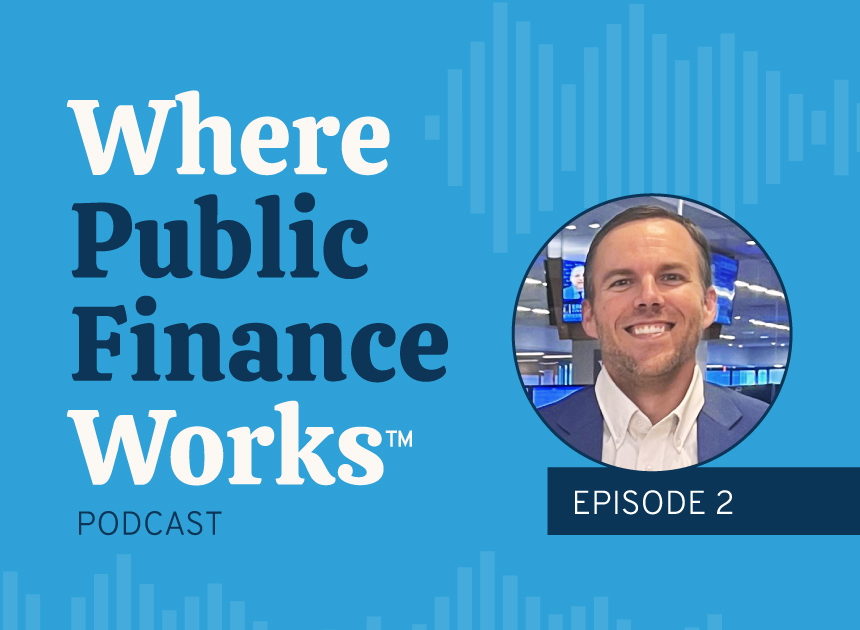Episode Summary
In this episode of Where Public Finance Works, we discover how the country’s 5th fastest-growing city manages more than a billion dollars in debt to improve communities in Charlotte, North Carolina. Listen along as Matthew Hastedt, Charlotte’s Treasurer, speaks on forecasting city revenues and how strategic legislation lobbying protects both urban and rural interests. Matthew takes you into the $200 million Spectrum Center improvements, the city’s partnership with the Charlotte Hornets basketball team, and how he faces the delicate balance of directing hospitality taxes.
Join our host, Tyler Traudt, as he uncovers how hundreds of millions in draw programs are managed, saving millions in interest on massive infrastructure projects and keeping municipal services like water and sewer affordable.
Learn how Matthew’s commitment to city department collaboration and his advocacy for draw programs have revolutionized Charlotte’s strategy for appropriately allocating the city’s funds toward competing projects.
Featured Guest
Matthew Hastedt is the City Treasurer for Charlotte, North Carolina. His public finance experience began in 2009 when he received a Master’s in Public Administration from James Madison University and worked in the Economic Development office helping with business recruitment.
He got his start in the City of Charlotte as an Economic Analyst. His interest in debt led to a career-making turn as an Assistant Debt Manager where he handled the city’s outstanding debt. He then transitioned to the role of Debt Manager where he focused on hospitality and general obligations credit. He now serves as the City Treasurer of Charlotte where he supervises the cash and investment team, debt management, and capital financings for the city.
Top Takeaways From Episode Two
- Draw programs grant cities flexibility that allows for adaptive capital management: Matthew shares how draw programs help avoid idle funds and the accruing interest that comes with delayed projects. These savings are passed on to residents proving that strategic financial management directly benefits the community’s bottom line.
- Hospitality taxes hold stringent regulations dedicated to bolstering tourism: Matthew gives insight into how the city leverages these taxes to enhance its attractiveness to visitors and revenue generation without diverting resources from essential services like public safety.
- City projects are more than just infrastructure—they’re the lifelines that connect and enhance communities: Matthew talks about Corridors of Opportunity, a growth and development program that aims to preserve the unique character, culture, and history of six underinvested areas in Charlotte. Every corner of the city deserves to flourish—not just individual pockets.
Public Finance Insights
[2:26] A winding path in finance leads to a job with the City of Charlotte: Upon graduation from his Masters in Public Administration program in 2009, Matthew’s first full-time position with the City of Harrisonburg is cut. This challenge, however, paves the way for a fresh start in Charlotte with two roles outside of public finance.
[6:34] Economic Analyst—a catalyst for financial modeling: In his role as Economic Analyst, Matthew investigates what the competing legislation impact would be for Charlotte through analysis with peer cities and the North Carolina League of Municipalities. When they determine the impact the legislation would make, he’s involved in lobbying on the residents’ behalf to ensure no one is hurt by these legislations.
[7:45] Forecasting major revenues for Charlotte: Matthew works on uncovering economic data all the way back to the 1980s to project future budgets and sales tax. In his words, when it comes to budgeting, “you can be under, but you can never be over at the end of the year.”
[10:17] The transition from Economic Analyst to Debt Manager: After leaning heavily into debt, Matthew moves into the role of Assistant Debt Manager for several years before landing a promotion to Debt Manager. Here he details the intricacies of hospitality and general obligation credits.
[13:30] A partnership with the Charlotte Hornets leads to a draw program financing strategy: When the City Council approves $200 million for Spectrum Center improvements, Matthew must decide the best way to handle the financing. Matthew talks about the benefits to draw program financing over long-term financing, especially when it comes to projects such as roof repairs and creating a high-level facility for players.
[21:38] An in-depth overview of the different business units and needs of the city: This includes the allocation of general credit towards streets, neighborhoods, and affordable housing as well as the investment in public facilities including police stations and fire departments. Matthew also talks about the important services such as waste, water, and utilities for the city along with storm water credits to address surface water and runoff. And at the heart of his expertise lies the domain of hospitality finance.
[24:26] The most effective and efficient way to get capital at the lowest cost: Matthew discusses the flexibility of the draw program. If a project gets delayed it's going to sit in the bank for years gathering interest. With the draw program, if a project is delayed, then capital is not sacrificed, and the city can move onto another project—only paying interest on the money that is spent.
[37:10] City projects bundled on one line of credit: With $1 billion being spent on city draw programs in one year, Matthew strategically places projects together on one line of credit so the city can save millions of dollars.
[47:09] Reinvestment in the city provides safe and thriving communities: Matthew talks about the sense of responsibility and excitement seeing how his team is impacting city residents. He discusses Corridors of Opportunity and the balance of building thriving communities while still maintaining their character, culture, and history.
[52:07] Every project has merit: Sometimes it all comes down to knowing if the city can reasonably afford an improvement. Matthew reflects on the public financing team’s ability to do a job very well which leads to producing more projects for the community.







.jpg)
.jpg)
.jpg)
